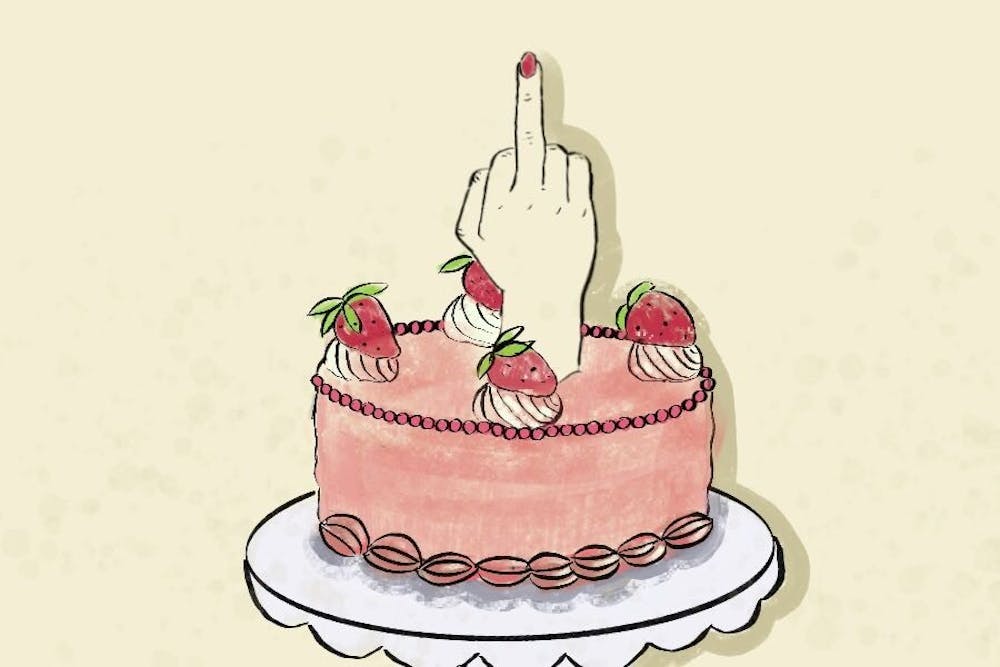For better or for worse, art, media, and protest seem more intertwined than ever these days. Social media's effect on the symbiotic relationship between activism and art is undeniable. New platforms allow artists and activists to amplify one another's voices and grow a following without wealth or fame. For evidence of this, look no further than the trend of subversive femininity that's overtaking our timelines and Instagram feeds. Set against the backdrop of an administration that has been criticized by many as anti–feminist, these female creators are turning traditionally female hobbies into political action.
Artists are turning previously domestic tasks into feminist works through subversion—the act of taking something meant to have a certain meaning and changing it by undermining established patterns. Feminist art is specifically about taking parts of daily life previously used to oppress women and transforming them into something empowering. Notable examples include baking, embroidery, and knitting. However, instead of making baby hats, birthday cakes, and tablecloths, women embroider clothes with vaginas or bake cakes that are adorned with middle fingers with the intention of toppling the norms of the craft.
One specific example of the intersection between art, social media, and activism is the hot pink "pussyhats" that emerged while the Women’s March was gaining traction in early 2017. Started by two independent artists who flipped the traditionally domestic task of knitting into a political statement, these kitschy hats soon became the trademark of a defining movement. People took to the streets with them, posted photos with them, and bought them en masse.
Similarly, many other artists subvert decidedly feminine tasks, like baking or embroidery, generating a wave of small yet impactful political statements. Take Becca Rea—Holloway. One of the most–followed subversive bakers, she's known for emblazoning cakes, pies, and cookies with political statements, facts, and opinions, and posting them to her increasingly--popular Instagram account, @thesweetfeminist. Each post is inspired by the biggest news stories of the moment, with one yellow cake reading, ‘Cyntoia is free!’, and another pink cake with blue lettering noting, ‘ICE stole 680 people yesterday.’ Other cakes are slightly less political, with sayings like ‘some days you just need cake.’
Rea–Holloway’s work is so popular that she’s even been plagiarized by Miley Cyrus and her collaboration with Planned Parenthood, Marc Jacobs, and The Happy Hippie Foundation. In May 2018, Rea–Holloway posted a white cake covered in a pink outline and multicolored confetti sprinkles, adorned with the phrase ‘ABORTION IS HEALTHCARE.’ It garnered lots of attention on the Internet, with reposts across many different social media platforms. Over a year later—in June 2019—Cyrus’ collaboration with Planned Parenthood came out, and the marketing for it featured her licking a cake that was nearly identical to Rea–Holloway’s. Outrage ensued, eventually leading Cyrus to credit Rea–Holloway in an Instagram caption after the baker received death threats for claiming credit.
Compared to a subversive baking scene that’s been full of controversy, the world of subversive embroidery is slightly calmer. Despite its smaller profile on Instagram, huge profits are being made off of the trend by clothing company Lingua Franca. Inspired by her mother–in–law but catalyzed by the outcome of the 2016 election and President Trump’s tweets and sayings, Rachelle Hruska MacPherson made a business out of embroidering political phrases onto cashmere sweaters and other clothing items.
The sweaters, which retail at upwards of $350 feature phrases like ‘love is love,’ ‘my body is not a political playground,’ and ‘I miss Barack.’ Some even quote President Trump directly, with phrases like ‘bad hombre’ and ‘stable genius.’ While the sweaters are extremely expensive, they still garnered attention throughout social media and gripped the fashion world, with larger companies like Banana Republic copying the unique embroidery style and political phrases at a more approachable price point.
While the statements made by these artists exist as part of a larger movement that turns stereotypically feminine and domestic activities into something teeming with dissidence and anger, the question of whether it does any good still remains. Can an Instagram post of a cake or a sweater really do anything other than spread awareness? That’s up to the consumer to decide. However, beautiful things can serve as potent fundraisers and inspirations for causes that matter, especially when produced ethically.
After all, if a pretty cashmere sweater inspires someone to take action, or a cake raises money for a worthy cause, then it can only be a good thing.







